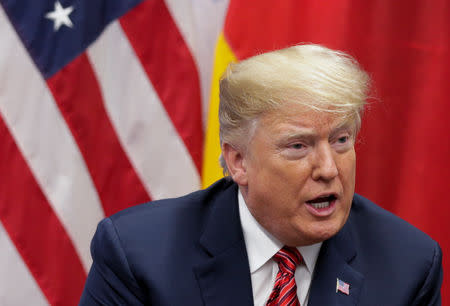Trump asks Pakistan PM for help with Afghan peace talks

By Drazen Jorgic
ISLAMABAD (Reuters) - Pakistan said on Monday U.S. President Donald Trump has sought its help with faltering Afghan peace talks, part of intensifying efforts by Trump to end one of America's longest wars.
Trump, in a letter to new Prime Minister Imran Khan, asked for Pakistan's "support and facilitation" in negotiating an end to the war and offered to renew the strained relationship, Pakistan's foreign ministry said.
The overture to Khan represents a sea change from Trump's normally harsh rhetoric towards Pakistan, and will add to growing speculation that the United States is planning to pull out of Afghanistan in the near future.
The U.S. president wants to bring to a close the 17-year-old conflict between Afghan security forces and the Taliban, who are fighting to drive out international forces and reestablish their version of strict Islamic law after their 2001 ouster.
A White House official confirmed that Trump had sent a letter to Khan and U.S. Defense Secretary Jim Mattis said the war in Afghanistan had gone on for long enough.
"We are looking for every responsible nation to support peace in the subcontinent and across this war in Afghanistan," Mattis told reporters before the start of his meeting with his Indian counterpart.
"It is time for everyone to get on board," Mattis said.
U.S. officials have long been pushing Pakistan to lean on Taliban leaders, who Washington says are based inside Pakistan, to bring them to the negotiating table.
"He has asked for Pakistan's cooperation to bring the Taliban into talks," Information Minister Fawad Chaudhry told Reuters.
Trump told Khan the Pakistan relationship was very important to the United States and to finding a solution to the Afghanistan conflict, Chaudhry added.
Trump has been open about his desire to bring home about 14,000 U.S. troops who remain in Afghanistan as part of Resolute Support and a separate counter-terrorism mission aimed against militant groups such as al Qaeda and Islamic State.
"President Trump has also acknowledged that the war had cost both USA and Pakistan. He has emphasised that Pakistan and USA should explore opportunities to work together and renew partnership," the foreign ministry said in a statement.
The ministry added that Pakistan is committed to playing "a facilitation role in good faith".
"Peace and stability in Afghanistan remain a shared responsibility."
UNEASY ALLIES
Trump has appointed Afghan-born U.S. diplomat Khalilzad as a special envoy for Afghanistan, tasking him with pushing through peace talks.
Khalilzad last month set a deadline of April 2019 for the war to end. But Afghan Taliban militants last month rejected the proposed deadline and said a three-day meeting in Qatar between their leaders and Khalilzad, to pave the way for peace talks, ended with no agreement.
Khalilzad on Sunday began an eight-country tour, which includes Pakistan, Russia and Qatar, to promote peace and convince the Taliban to join negotiations.
In Trump's letter, "the president recognises that Pakistan has the ability to deny the Taliban sanctuary on its territory. The letter also makes clear that Pakistan’s assistance with the Afghan peace process is fundamental to building an enduring U.S.-Pakistan partnership," the White House official said.
Officially allies in fighting terrorism, Pakistan and the United States have a complicated relationship, bound by Washington’s dependence on Pakistan to supply its troops in Afghanistan but plagued by accusations Islamabad is playing a double game.
Last month, Trump said in an interview Pakistan doesn't "do a damn thing" for the United States despite billions of dollars in U.S. aid, adding that Pakistani officials knew of former al Qaeda leader Osama bin Laden's location before his killing by U.S. troops in a 2011 raid inside Pakistan.
Khan hit back by saying the United States should not blame Pakistan for its failings in Afghanistan.
Pakistani officials, who deny offering safe havens to the Afghan Taliban, say their influence on the group has waned over the years.
Last week, Afghan President Ashraf Ghani said he had formed a 12-strong team to negotiate peace with the Taliban, but warned that implementation of any deal would take at least five years.
On Monday, the Pentagon said that a U.S. soldier injured in a roadside bomb blast last month in Afghanistan had died of his injuries.
The U.S. military said Sergeant Jason Mitchell McClary died of his injuries in Landstuhl, Germany, bringing the number of U.S. troops killed in the Nov. 27 explosion in Ghazni to four.
(Reporting by Drazen Jorgic. Additional reporting by Idrees Ali in Washington; Editing by Clarence Fernandez and Alistair Bell)

